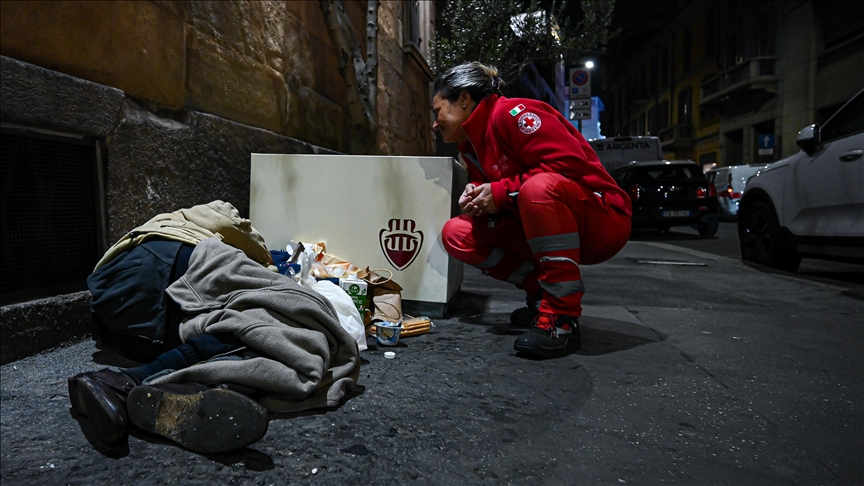'Invisible' owners of streets and squares in Italy: The homeless
As countries mark World Homeless Day, Italy's streets are home to over 50,000 people in need
 Italian Red Cross members provide food and assistance to the homeless people in Rome, Italy on October 7, 2022.
Italian Red Cross members provide food and assistance to the homeless people in Rome, Italy on October 7, 2022.
ROME
As countries mark World Homeless Day on Monday, Italian streets are home to over 50,000 people, and the number is growing by the day, according to unofficial sources.
The homeless in Italy, mostly immigrants from different nationalities, live under difficult conditions on the streets and squares of the Italian capital Rome and the second-largest city Milan.
Francesco Nicolai, 66, who prefers to be identified by first name, has been receiving help from the Italian Red Cross volunteers in Rome, he said, adding that he has been a homeless for 26 years.
"I am 66 years old, waiting for my retirement. It is very difficult to find a job at this age," he told Anadolu Agency.
Francesco and his dog Tommaso that he adopted six years ago have been living on the streets. He said he has a bed at the entrance of the Ara Pacis Museum in Rome for the last 10 years, where he spends the nights.
"During the day, we stop at a nearby hotel," he said. We go to the cafeteria in the afternoon. We come back here with him (Tommaso) in the evenings."
Another homeless, Alberto, lives at Risorgimento Square near the Vatican City. He said he does not have "really big financial problems," adding: "I'm divorced, and I decided to help others."
"I sometimes sleep here, sometimes in the accommodation center, sometimes in the Vatican. Here, these people are in big trouble. I'm helping everyone here," he continued.
Francesca Nicolai, a Red Cross volunteer who works in Rome, said they regularly approach homeless to understand their needs.
He said they distribute hot tea, biscuits, and soup, as well as hygiene products such as toilet paper to the homeless.
They also provide blankets when the weather is cold, and their main purpose is to talk to them, understand their problems, and find solutions.
Marco Tozzi, another Red Cross volunteer in Milan, said he started helping homeless people in 2001, and the number of volunteers has been growing since then.
"We have approximately 500 volunteers. We have also increased our service quality since 2015. I am a volunteer, but psychologists and education professionals have also joined us," he said.
"People don't choose to live on the street," he said. "Many end up in this situation after years of suffering. It may have been caused by economic problems, psychological problems, and social problems, or a combination of all three."
Anadolu Agency website contains only a portion of the news stories offered to subscribers in the AA News Broadcasting System (HAS), and in summarized form. Please contact us for subscription options.







